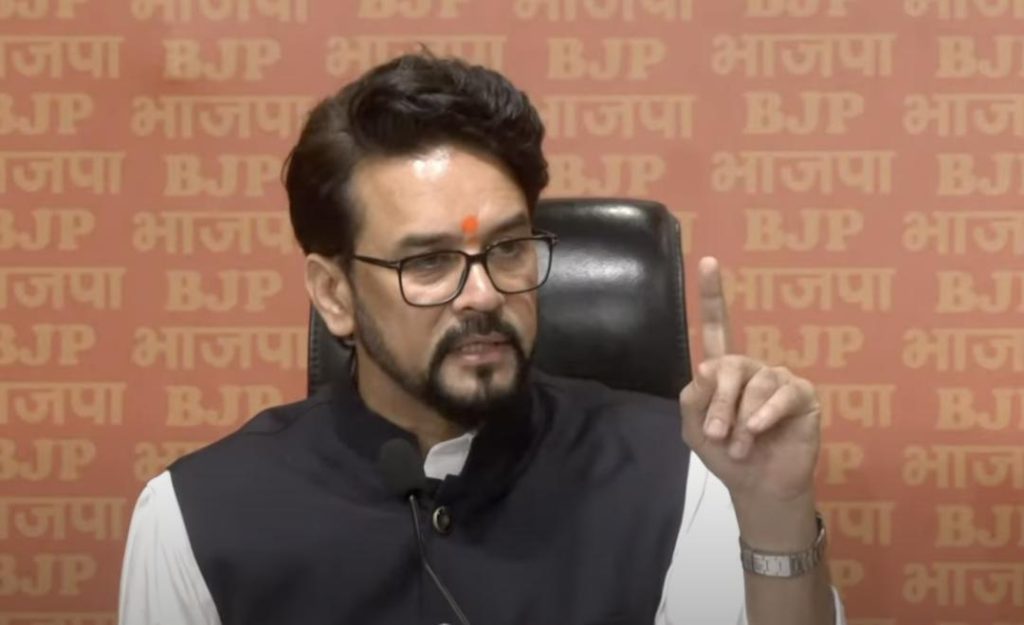
Congress & CPI made Bhimrao Ambedkar lose the poll in 1952: BJP
The 1952 general elections in India were a significant milestone in the country’s democratic journey. It was the first general election after India gained independence, and it marked a turning point in the country’s political landscape. However, the elections also saw a shocking defeat for a stalwart of Indian politics, Dr. Bhimrao Ambedkar, the chairperson of the Drafting Committee of the Constitution. According to recent claims made by BJP MP Anurag Thakur, the Congress and the Communist Party of India (CPI) colluded to ensure Ambedkar’s defeat.
Thakur made these remarks in a recent statement, stating that the Congress laid the foundation of electoral corruption in the very first election of 1952. “Congress and CPI together defeated Dr. Bhimrao Ambedkar, a constitution maker and saint-like leader, in the election,” he said. “74,333 votes were rejected,” he added. Thakur also emphasized that the Congress ensured that a constitution maker, a Dalit leader, was eliminated in the very first election.
The 1952 general elections were held in May and June of that year, with the Indian National Congress (INC) led by Jawaharlal Nehru emerging as the largest party with 364 seats. The CPI, led by Shripad Amrit Dange, won 16 seats, while the Socialist Party, led by Ram Manohar Lohia, won 12 seats. The All India Forward Bloc, led by Subhas Chandra Bose, won 10 seats.
Ambedkar, who was a prominent Dalit leader and a key figure in the Indian independence movement, had contested the election from the Bombay South constituency. However, he lost the election to the Congress candidate, Yashwantrao Chavan. Ambedkar’s defeat was attributed to various factors, including the lack of organizational support from the Indian National Congress, which was dominated by upper-caste Hindus.
However, Thakur’s claims suggest that the Congress and the CPI colluded to ensure Ambedkar’s defeat. According to him, the Congress and CPI worked together to reject a large number of votes, which ultimately led to Ambedkar’s defeat. This claim has sparked a controversy, with many arguing that it is unfounded and lacks evidence.
The role of the Congress and the CPI in Ambedkar’s defeat is a topic of ongoing debate. Some historians have argued that the Congress was not interested in supporting Ambedkar’s candidacy, given its upper-caste bias. Others have suggested that the CPI, which was seen as a rival to the Congress, may have worked to undermine Ambedkar’s candidacy.
However, Thakur’s claims have reignited the debate on the role of the Congress and the CPI in Ambedkar’s defeat. His statement has also raised questions about the conduct of the 1952 general elections, which were marred by irregularities and allegations of electoral malpractice.
The controversy surrounding Ambedkar’s defeat has also highlighted the need for a deeper understanding of the complex political dynamics of the time. Ambedkar’s defeat was not just a personal loss, but also a setback for the Dalit movement, which was gaining momentum in the early years of independence.
In conclusion, the controversy surrounding Ambedkar’s defeat in the 1952 general elections is a reminder of the complex and often contentious nature of Indian politics. While Thakur’s claims may be disputed, they have also raised important questions about the conduct of the elections and the role of the Congress and the CPI in Ambedkar’s defeat. As India continues to grapple with issues of electoral reform and social justice, the legacy of Ambedkar and the events of 1952 remain an important part of its political heritage.
News Source:
https://youtu.be/0kLyW5rSJSg






